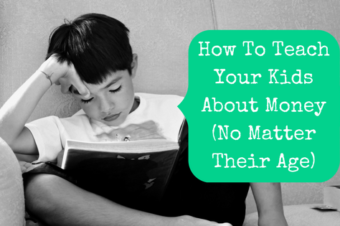I am officially a homeschool mom. While my kids have been home since March, I decided to officially cut ties with the local elementary school and go out on my own this fall. And I can honestly say that I have had no regrets whatsoever.
So far in third grade math, my daughter has learned how to count coins and different kinds of bills. This week, my daughter is going to be learning how to write a check. It is all very helpful (her older brother never learned to write a check in school!), but it isn’t enough. Kids learn in school the difference between a dime and a nickel, but they don’t learn what to do with them. That’s our job as parents. Some schools now offer financial classes, which you really should encourage your kids to take, but learning about compounding interest is still only a piece of personal financial management.
It would be easy if the schools would just teach our kids everything, but there are some things that must be learned at home. Like table manners. Or brushing teeth. Or money management.
Now, you may be thinking, “I can teach my kid to brush her teeth, but money management? Why can’t the schools teach that again?”
Teaching Kids About Money Is A Parent’s Responsibility
It’s scary and intimidating for most parents to think about teaching their kids about money. Money is a taboo subject in our culture, so it can be hard to talk about. And a lot of parents simply aren’t confident enough in their own money management skills.
You may need to brush up on your skills a bit (you’re in luck, you’re reading just the blog for that!), but if you really want the best for your kids, you need to teach them about money. Do you really want your kids learning about paying taxes from people like Willie Nelson (owed the IRS $16.7 million in 1990) or learning about debt from Kanye West (who a couple of years ago revealed he owed $53 million)? I sure don’t!
How To Teach Your Kids About Money
So how do you teach your kids about money? And is it too late if they’re already teenagers?
Here are three keys to teaching your kids about money. And you’re in luck! They work at any age, though the younger you start, the better.
1. Set A Good Example
We’ve all caught ourselves telling our kids not to talk with food in their mouths while we’re still chewing our last bite. But that just won’t cut it when it comes to money management. Our kids don’t really care what we say, but they watch what we do. And whether we want them to or not, they will mirror our behavior.
If you want your kids to have a strong foundation in their finances, you need to model to them how to do it. I know, it’s much easier said than done. But it’s true. The first step in teaching your kids about money is to simply show them.
2. Talk To Your Kids About Money
In our American culture, there are certain things we don’t talk about. That list is getting smaller and smaller, but it still exists. Sex lives seem to have escaped the list, but money still hasn’t. Can you believe that a 2013 study found that 63% of Americans would rather share their body weight with co-workers than their bank account balance?
That same avoidance carries over into the home as well. Many parents say they would rather discuss drugs or sex with their kids than money.
Some things can be learned by observation. Your kids can probably learn how to load a dishwasher just by watching you, though I’m sure you’ve nagged them about silverware placement once or twice. But finances aren’t very visible. The only way your kids will learn about proper money management is if you actually open your mouth and talk about it.
Many parents don’t want to worry their kids or don’t want to admit their mistakes. If you’re stressed about money, they will pick up on it whether you are open about it or not. Talking about it will probably make them feel better, even if things aren’t going well. The only way to prevent them from the same pitfalls is by talking about them. Give them the chance to learn from your mistakes so they don’t have to repeat them.
Silence about money will only cause your kids problems. Most parents don’t expect their kids to understand the dangers of drugs just because they have never seen their parents shoot up. Some things require more in-depth discussion and openness, and finances are one of them.
3. Get Your Kids Involved
Learning theory and research have consistently shown that the more active a learning experience is, the greater the learning gains and retention. How do you teach your kids about money? Let them do it!
How this plays out will differ by age. If you are buying your preschooler a toy, have him hand the money to the cashier himself. In this transaction, he will learn that he has to give up something (the money) in order to gain what he wants (the toy). He will learn that everything costs something.
If your 10-year-old has been begging you for a new video game, don’t just refer her to grandma. Have her figure out the cost of the new video game, plus tax (don’t want her to end up like Willie Nelson), and help her save up for it.
Let your teenager buy her back-to-school clothes (yes, some day they will go back to school) on her own with a set amount of money. She will either be more frugal than if you were with her or learn the hard way the value of budgeting.
Nowadays, a lot of kids are going off to college only to realize that they have no clue how to use money. Don’t let your kid be one of them. Take the time now and make a conscious effort to teach them about money. Otherwise, their bank’s overdraft fees will (we hope).






















